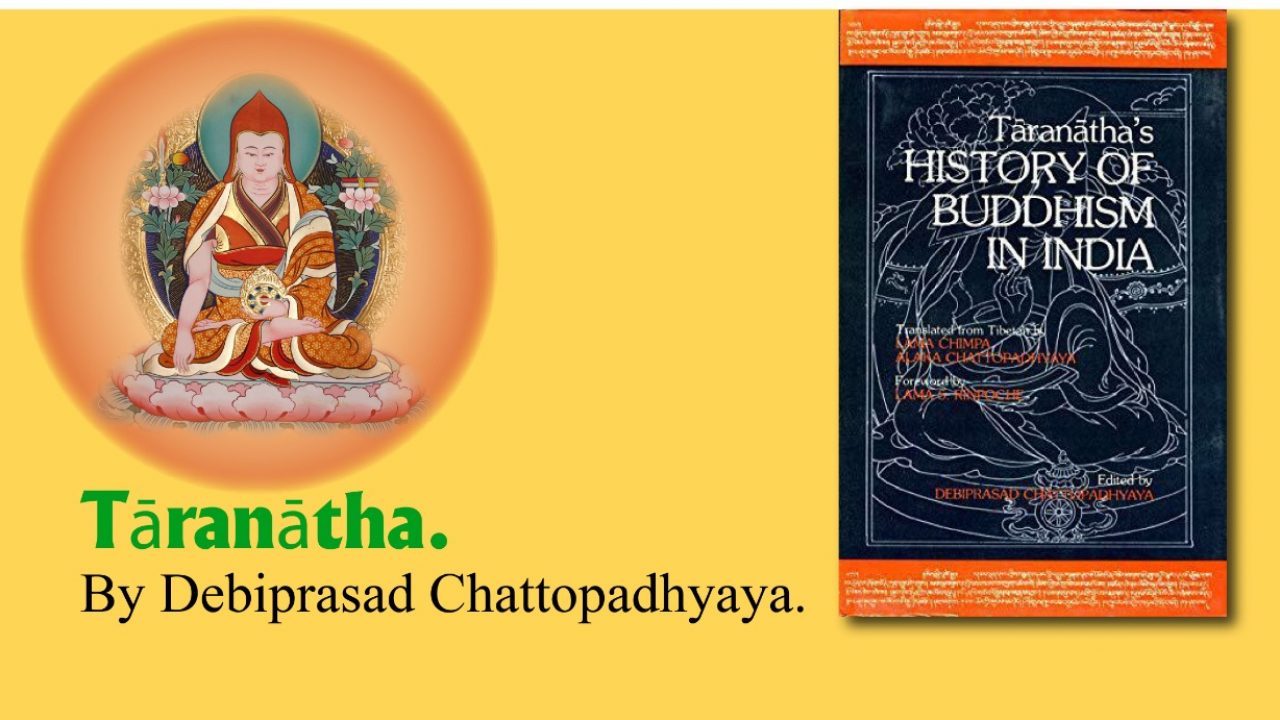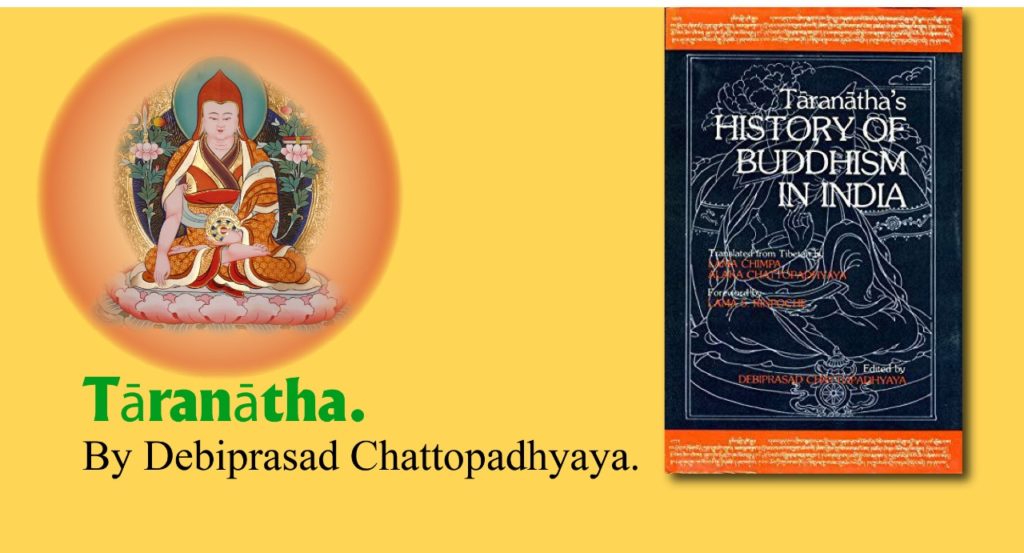by Tāranātha
Oṃ svasti! The Three Reasons for Confidence is a work that recounts the life and liberation of the Great Master Padmākara.
I pay homage to the guru!
An ocean of eloquent speech, the uninterrupted teachings of the victors,
Sometimes assumes the form of a spiritual teacher,
Who fills every direction with the light of the sacred Dharma,
Displaying countless maṇḍalas while never wavering
From the luminous vajra heart essence.
Padmākara, with devotion, I bow to you.
In this account, I discard whatever is false, and instead recount whatever I have found to be true.
There was a time when the tantric teachings of our guide, the perfectly enlightened Buddha, ranged far and wide throughout the land. King Devapāla[2] ruled the supreme kingdom of Magadha[3] and glorious Uḍḍiyāna[4] was ruled by King Hayalīla,[5] and all in accordance with the Dharma. There was a learned teacher of the warrior caste who had adopted the Three Jewels as his spiritual guide. In the language of Uḍḍiyāna, this man’s name was Srado, and in the language of India he was Sragdhara, Holder of the Flower Garland. Srado fathered a son, an infant born with all the physical marks of perfection. His skin was white, tinged with red, and there was the pattern of a lotus on his ring ringer. His eyes and lips were like lotuses in bloom, and his skin bore many virtuous signs—marks such as lotus flowers, hooks and lassos.
The child’s birth was celebrated with a great feast. When the brahmins examined the signs, some foretold that he would become a king, others that he would be ruler of a principality, and others still that he would live in charnel grounds and bring ruin upon the family line. With such a variety of good, bad and indeterminate prophecies, nothing was certain. However, all were in agreement that it would be difficult for others to prevail over him. Finally, a highly accomplished yogin was asked and he said, “This child will be most supreme among practitioners of the Secret Mantra, and, because he has all the marks of the Lotus Family, he will always carry Amitābha’s blessing. Therefore, combining Padma (lotus) and Avabhāsi (shining), his name shall be Padmāvabhāsi.”
As Padmāvabhāsi grew up, he became effortlessly skilled in all the minor sciences such as writing, grammar, logic, medicine, crafts and the eight ways of reasoning. In the temple at Saṃrakṣa, he took refuge from a vinaya-holder and received the five fundamental precepts. While there, he studied extensively both abhidharma and sūtra. Śantirūpa, a skilled tantric adept, gave the young Master many empowerments for the maṇḍalas of kriyā-, upa- and yoga-tantras—and the flowers that Padmāvabhāsi threw invariably landed on the deities of the Lotus Family. He also sought direction from a merchant’s son named Sukhadeva, a siddha who was indivisible from Noble Avalokiteśvara, and likewise from a prostitute, called Sukhadarī. Sukhadarī was yet another great siddhā who had appeared in Uḍḍiyāna, had heard the teachings directly from the Vajradhara himself, and received the instructions of the Secret Inner Tantras.
Padmāvabhāsi retreated to a pleasure grove and engaged in the practices of Approach, Close-Approach, Accomplishment and Great Accomplishment. At first, his practice caused various ill omens to arise—such as thunderous noises, frightening forms, a fire in the grove, and the destruction of his retreat dwelling. However, he meditated without falling under their power and there gained accomplishment in the vidyā-mantras[6] that he had learned. In his dreams he had visions of many buddhas and bodhisattvas headed by Buddha Amitābha, Buddha of Boundless Light. He had direct visions of the King of the Wrathful Deities, Hayagrīva, the Horse-Headed One. And he brought ḍākinīs and minor bhūtas into his service.
Shortly after, the time came to take up the work of his father’s family. As a Brahmin, this meant acting as counsellor to the king. He would often go to the royal palace, engage in government affairs and give explanations of astrological and other texts. This was shortly after Prince Akṣalīla, King Hayalīla’s son, had become the heir to the throne. Padmāvabhāsi wished to bring the Dharma to the kingdom and thus urged the king to support him in this vast and virtuous endeavour. In the middle of the pleasure grove, Padmāvabhāsi built a temple and a residence for the saṅgha surrounded, on the boundary, by stūpas and a series of walls. The Master had three assistants: one was the king’s secretary and two were ministers. However, they developed evil intentions and secretly plotted, “We three must try to take possession of this land and its people!” At length, their spokesman, the secretary, approached the king, “There is no longer any doubt:
Padmāvabhāsi wants to rule the kingdom. He and the thousand monks residing in the pleasure grove are skilled in warfare. They know how to destroy their enemy, are extremely courageous in battle and when they say the pleasure grove is being turned into a temple, it’s a lie. Really, encircled as they are with strong walls and more, they are quite able to fight against the king!”
The king consulted his ministers, and all agreed with the secretary. This was partly due to what the two ministers reported and partly because of their own jealousy. So the king sent off the ministers with an army.
At that time in Uḍḍiyāna, it was against the law for kings to kill brahmins, monks and paṇḍitas. All they could do was to issue a royal command, “Counsellor! You and your monks and spiritual teachers are to leave your possessions and be gone—to another land with you!” The monks followed the command and left. As the Master was preparing to leave, the ministers said, “If we do not put him to death, then we ourselves will surely come to harm,” and sent many assassins after him. But when they tied the Master up, he cut the rope and broke his chains through the power of vidyā-mantras. When they stabbed him with weapons, his body sustained no harm and it was the weapons that shattered. When they set fire to him, he did not burn. When they threw him into water, he simply popped up again like a little aquatic bird. When they threw him over a cliff, he was not hurt. When they put him in a hole and buried him, he tunnelled to the surface a long way off and escaped. Although they kept managing to seize him, they could not overpower him.

